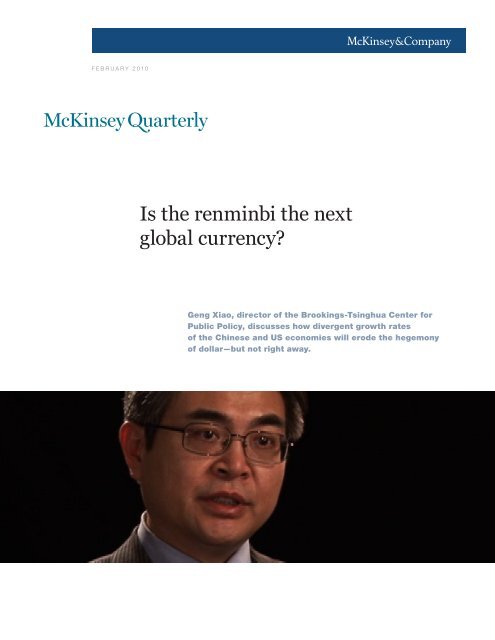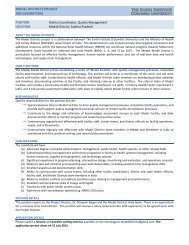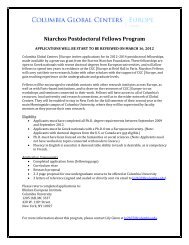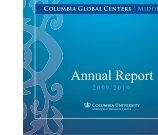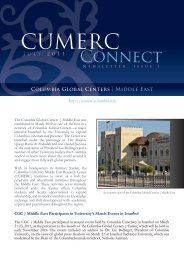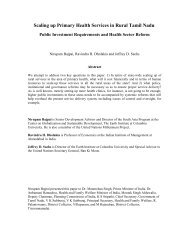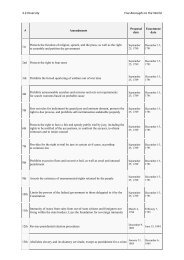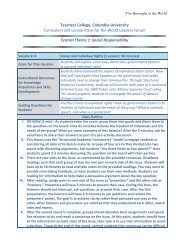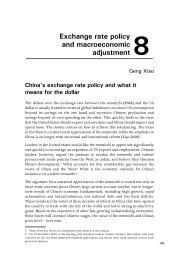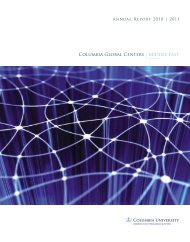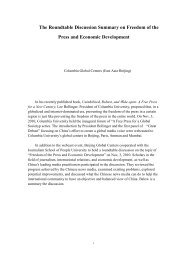Is the Renminbi the Next Global Currency, McKinsey - Columbia ...
Is the Renminbi the Next Global Currency, McKinsey - Columbia ...
Is the Renminbi the Next Global Currency, McKinsey - Columbia ...
You also want an ePaper? Increase the reach of your titles
YUMPU automatically turns print PDFs into web optimized ePapers that Google loves.
1<br />
F E B R U A R Y 2 0 1 0<br />
<strong>Is</strong> <strong>the</strong> renminbi <strong>the</strong> next<br />
global currency?<br />
Geng Xiao, director of <strong>the</strong> Brookings-Tsinghua Center for<br />
Public Policy, discusses how divergent growth rates<br />
of <strong>the</strong> Chinese and US economies will erode <strong>the</strong> hegemony<br />
of dollar—but not right away.
2<br />
The US dollar’s run as <strong>the</strong> world’s stable currency has stumbled with <strong>the</strong> recent<br />
financial crisis. Waiting in <strong>the</strong> wings is <strong>the</strong> renminbi. But according to economist Geng<br />
Xiao, it’s still in China’s—and <strong>the</strong> world’s—best interest not to dump <strong>the</strong> dollar just yet.<br />
In this video interview, Geng Xiao, director of <strong>the</strong> Brookings-Tsinghua Center for Public<br />
Policy, explains why China needs time to push through difficult economic reforms at home<br />
before it can allow its currency to float freely against <strong>the</strong> dollar. <strong>McKinsey</strong> Publishing’s<br />
Clay Chandler conducted <strong>the</strong> interview with Xiao in Hong Kong.<br />
The Quarterly: The United States has long held that <strong>the</strong> currency of China is<br />
undervalued, that it gives an unfair advantage to Chinese exporters, and that it costs<br />
Americans jobs. Authorities in China beg to differ; <strong>the</strong>y say that it helps to preserve<br />
stability. Can you help us to understand <strong>the</strong> arguments on both sides of this debate?<br />
Geng Xiao: There’s no argument about <strong>the</strong> imbalance: China has <strong>the</strong> trade surplus, US<br />
has <strong>the</strong> trade deficit. So both sides want to improve that. But <strong>the</strong> question is how. From <strong>the</strong><br />
American perspective, <strong>the</strong> emphasis is on <strong>the</strong> short-term adjustment through price and<br />
through <strong>the</strong> exchange rate. So <strong>the</strong> US wants a quick adjustment in RMB exchange rate, and<br />
that means appreciation so it can correct <strong>the</strong> trade imbalances.<br />
But <strong>the</strong> Chinese put more emphasis on medium- and long-term structural and institutional<br />
change. So that’s <strong>the</strong> debate. It’s very difficult for <strong>the</strong> exchange rate to correct <strong>the</strong> trade<br />
balance. And on <strong>the</strong> o<strong>the</strong>r hand, <strong>the</strong>re are some negative consequences of <strong>the</strong> exchangerate<br />
uncertainty.<br />
Foreign investors, including American investors, want to invest in RMB assets because of<br />
<strong>the</strong> expectation of RMB appreciation. This is what we call “hot money.” And <strong>the</strong>se capital<br />
flows are creating a lot of bubbles in <strong>the</strong> property market, in <strong>the</strong> stock market.<br />
And that creates difficulties for China’s central bank in terms of monetary policy making.<br />
So you can see that <strong>the</strong>re are a lot of concerns from <strong>the</strong> Chinese side about using <strong>the</strong><br />
exchange rate to correct <strong>the</strong> trade balance. Some prices are so high in China. Some are<br />
so low. So you need a benchmark. China needs a benchmark so that <strong>the</strong> price can be<br />
compared to <strong>the</strong> global price, to <strong>the</strong> price structure, which is compatible with efficiency.<br />
So that’s why price reform is more important than exchange-rate change. Exchange-rate<br />
change would not really change <strong>the</strong> inefficiencies in <strong>the</strong> use of energy, for example, because<br />
people will still waste energy. Even though you change <strong>the</strong> exchange rate, <strong>the</strong> internal<br />
subsidies are still <strong>the</strong>re. So I think <strong>the</strong> point is that China needs to eliminate a lot of <strong>the</strong>se<br />
structural distortions, structural inefficiencies. And <strong>the</strong>n if <strong>the</strong>re’s little distortion, I think<br />
a floating exchange rate will apply and will be useful for China.
3<br />
The Quarterly: What are <strong>the</strong>se reforms and how long will <strong>the</strong>y take?<br />
Geng Xiao: China has already started a lot of its reforms. But it’s going to take anywhere<br />
from 5 to 10 years’ time, really, for China to correct its distortions—land reform, reform<br />
of <strong>the</strong> energy sector, state-owned-enterprise reform, and social welfare. During <strong>the</strong> last<br />
30 years, most of <strong>the</strong> tradable-goods prices have become more or less consistent with <strong>the</strong><br />
global price structure. Only <strong>the</strong> nontradable sectors still have a different price structure<br />
compared to <strong>the</strong> global price structure.<br />
So <strong>the</strong> nontradables are <strong>the</strong> key. And you have to understand, nontradable prices in China<br />
have to be lower than in <strong>the</strong> United States because China still is a developing country and<br />
still has low productivity. Only when <strong>the</strong> productivity of China’s nontradable sector reaches<br />
that of <strong>the</strong> United States will <strong>the</strong> two countries’ price structures converge. And that is a<br />
long process.<br />
It actually is in America’s interest to allow China to carry out structural and institutional<br />
reforms instead of exchange-rate change. Let me explain why. China is not really<br />
competing with <strong>the</strong> United States. Even if you change <strong>the</strong> exchange rate, it will have very<br />
little impact on US trade deficit because <strong>the</strong> US is going to buy from some o<strong>the</strong>r countries.<br />
US people should realize that in <strong>the</strong> past, <strong>the</strong> US production was largely for American<br />
consumers. But because of <strong>the</strong> global financial crisis, American consumers are not<br />
consuming.<br />
So in <strong>the</strong> future, <strong>the</strong> US needs to produce for consumers from emerging markets, like<br />
China. That’s <strong>the</strong> key. They need to think about what to sell to Chinese consumers—not just<br />
Chinese consumers in China but also Chinese consumers who will go out and spend in <strong>the</strong><br />
United States.<br />
The Quarterly: China is now sitting on a stash of something like $2 trillion in foreigncurrency<br />
reserves. How much larger can this get?<br />
Geng Xiao: If China actually followed <strong>the</strong> advice of <strong>the</strong> US and allowed <strong>the</strong> RMB to<br />
continue to appreciate, I would say that China will continue to increase its foreignexchange<br />
reserves, because that bubble, that expectation generated by <strong>the</strong> holding of RMB,<br />
nobody can predict. It can be $4 trillion, you know, $6 trillion.<br />
I think as time goes on, China can do a lot in terms of diversification. But <strong>the</strong>re’s a limit,<br />
because if <strong>the</strong>re is expectation on RMB appreciation, you will get even more reserves. And<br />
most of <strong>the</strong> reserves start with <strong>the</strong> US dollar, because that’s <strong>the</strong> most liquid, <strong>the</strong> most<br />
stable currency. So I don’t see that <strong>the</strong>re’s any way that China can significantly reduce its<br />
holding of <strong>the</strong> dollar assets, because <strong>the</strong> world is just basically dominated by <strong>the</strong> dollar.<br />
In that sense, you know, I don’t think <strong>the</strong>re’s much choice for China. But if pushed hard,
4<br />
China can always do more. And even marginally, a little bit more is going to have a big<br />
impact in <strong>the</strong> market.<br />
I think <strong>the</strong> worst scenario is that China allows this RMB appreciation expectation to<br />
continue. So more and more people try to hold RMB. And that generates more and more<br />
foreign-exchange reserves.<br />
And <strong>the</strong>n China also wants to diversify from <strong>the</strong> dollar to o<strong>the</strong>r assets. All this is going to<br />
create a huge amount of disturbance, not just in <strong>the</strong> market but also pressures on <strong>the</strong> US<br />
Treasury. And that’s entirely unnecessary. I think <strong>the</strong> most effective way is for China to<br />
tolerate moderate inflation, which would certainly allow real appreciation of <strong>the</strong> Chinese<br />
currency, which would contribute to <strong>the</strong> rebalancing of <strong>the</strong> global economy and also would<br />
encourage Chinese people to hold <strong>the</strong> dollar, because <strong>the</strong> RMB will have much higher<br />
inflation than <strong>the</strong> dollar.<br />
And China, when its economy is growing 10, 15 percent a year, I think a 5 percent or 7<br />
percent inflation rate is entirely normal. And once that happens, I think China will have,<br />
actually, a shortage of foreign-exchange reserves because people will want to hold dollar<br />
assets. And <strong>the</strong>y will want to invest overseas. And that is going to create a balance. Right<br />
now, though, it is not a balance. It’s a [temporary] solution. Everybody wants to dump US<br />
dollars and hold RMB. And not just Chinese. The entire world, everybody in <strong>the</strong> world,<br />
wants to hold RMB. And that’s really a danger.<br />
The Quarterly: Does a global financial crisis have any bearing on China’s ability to<br />
diversify out of US dollars?<br />
Geng Xiao: Well, I think it’s not in China’s interest to dump <strong>the</strong> dollars that <strong>the</strong>y are<br />
holding. Because that would hurt China as a whole. China is a net holder of dollar assets.<br />
And I think more importantly, China actually benefits tremendously from <strong>the</strong> two-way<br />
capital flows, you know, <strong>the</strong> US investment in China, which helps to improve China’s<br />
investment efficiency. The problem is that <strong>the</strong> US has this authority as a global currency.<br />
But US monetary policy is entirely focused on <strong>the</strong> domestic policy, in <strong>the</strong> domestic<br />
unemployment.<br />
So, that creates an intrinsic problem. In principle, US monetary policy should take care of<br />
global stability. The interest rate for <strong>the</strong> global economy cannot be zero. But, effectively, if<br />
<strong>the</strong> US is adopting a zero-interest-rate policy, <strong>the</strong> whole world is going to be flooded with<br />
cheap money. That’s <strong>the</strong> fundamental problem. China is having difficulty dealing with that<br />
problem because US interest rates are zero. And China is flooded with hot money. But for<br />
China, <strong>the</strong>re aren’t many alternatives.
Related thinking<br />
“How corporate China is<br />
evolving”<br />
“<strong>Is</strong> China recession proof?”<br />
“The looming deleveraging<br />
challenge”<br />
“Economic Conditions<br />
Snapshot, December<br />
2009: <strong>McKinsey</strong> <strong>Global</strong><br />
Survey results”<br />
5<br />
The Quarterly: So, what do you foresee for <strong>the</strong> US dollar? Will it continue in its current<br />
role as <strong>the</strong> dominant global currency? Or is that role soon to come to an end?<br />
Geng Xiao: Well, if you look at <strong>the</strong> history, I think this will happen, definitely. It’s just<br />
a matter of time. In <strong>the</strong> past, we had <strong>the</strong> gold standard. We had <strong>the</strong> pound. We have <strong>the</strong><br />
dollar. And just think about it, if <strong>the</strong> Chinese economy continues its growth at <strong>the</strong> current<br />
pace, <strong>the</strong> Chinese economy will be <strong>the</strong> biggest in <strong>the</strong> world. And if you think about <strong>the</strong><br />
reforms in China in 10, 20 years’ time, China will be able to finish all <strong>the</strong> reforms. And <strong>the</strong><br />
Chinese economy would be a modern market economy, and <strong>the</strong> RMB will become one of<br />
<strong>the</strong> important reserve currencies, just like <strong>the</strong> US dollar.<br />
The Quarterly: Professor Xiao, thank you so much for joining us and sharing<br />
your views.<br />
Copyright © 2010 <strong>McKinsey</strong> & Company. All rights reserved.


